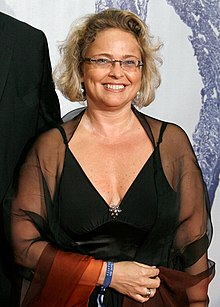Claudia Bandion-Ortner (born 30 November 1966) is an Austrian judge and politician, who served as the minister of justice.
Claudia Bandion-Ortner | |
|---|---|
 Claudia Bandion-Ortner in 2009 | |
| Minister of Justice | |
| In office 15 January 2009 – 20 April 2011 | |
| Prime Minister | Werner Faymann |
| Preceded by | Johannes Hahn |
| Succeeded by | Beatrix Karl |
| Personal details | |
| Born | 30 November 1966 Graz |
| Nationality | Austrian |
| Political party | Independent |
| Alma mater | Karl-Franzens University |
| Profession | Judge |
Early life and education edit
Bandion-Ortner was born in Graz on 30 November 1966.[1] She graduated from Karl-Franzens University in Graz in 1989 with a master's degree in law.[2]
Career edit
Bandion-Ortner began her career as a judge at the regional court for criminal matters in Vienna.[2] Then she became a chief judge.[2][3] She was appointed minister of justice to the coalition cabinet led by Werner Faymann on 15 January 2009, replacing Johannes Hahn.[4] Although she was an independent figure, the People's Party, partner of the Social Democratic Party in the coalition, nominated her for the post.[5] Her tenure lasted until 20 April 2011 when she was resigned from office and she was succeeded by Beatrix Karl in the post.[1][6]
After leaving office Bandion-Ortner served as the senior advisor at the international anticorruption academy in Laxenburg, outside Vienna, from August 2011 to August 2012.[2][7] In November 2012, Bandion-Ortner was appointed deputy secretary-general of the King Abdullah bin Abdulaziz international centre for interreligious and intercultural dialogue (KAICIID) that is based in Vienna.[8][9]
Personal life edit
Bandion-Ortner is married and has a child.[10]
References edit
- ^ a b "Mag. Claudia Bandion-Ortner". Parlament. Retrieved 14 July 2013.
- ^ a b c d "Deputy secretary-general". KAICIID. Archived from the original on 25 July 2013. Retrieved 14 July 2013.
- ^ "9 sentenced to prison in Austrian bank fraud case". The New York Times. Vienna. 4 July 2008. Retrieved 14 July 2013.
- ^ "Austria - Ministries, political parties, etc". Rulers. Retrieved 14 July 2013.
- ^ "New justice minister gets parliamentary christening". Austrian Times. 22 January 2009. Retrieved 14 July 2013.
- ^ Marcelo Jenny (December 2012). "Austria". European Journal of Political Research Political Data Yearbook. 51 (1): 36. doi:10.1111/j.2047-8852.2012.00002.x.
- ^ "UN-backed anti-corruption academy opens in Vienna". EU Business. Vienna. AFP. 2 September 2010. Retrieved 14 July 2013.
- ^ "New centre for interreligious dialogue". International Vienna (2). 2013. Archived from the original on 14 July 2013. Retrieved 14 July 2013.
- ^ "KAICIID: Historic Day for International Interreligious and Intercultural Dialogue". PR Newswire Europe. 2 November 2012. Archived from the original on 29 April 2014. Retrieved 14 July 2013.
- ^ Stephanie Levett (1 December 2008). "Long Live SPÖVP!". The Vienna Review. Archived from the original on 2 April 2015. Retrieved 14 July 2013.